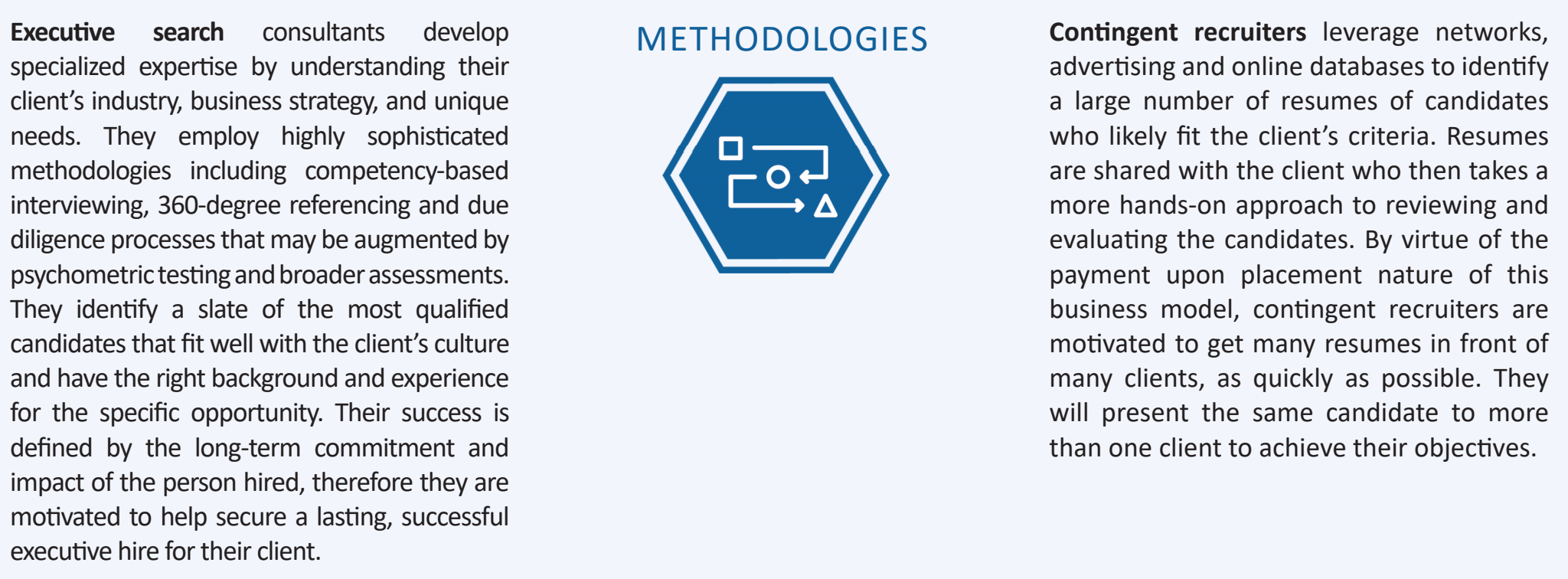Executive search vs Contingency Recruiters?
Having multiple discussions about the differences between recruitment and executive search with our clients, we decided to cover this topic in-depth here. Indeed, this is something that is not easy to understand unless you have already experienced hiring for the roles across the organization, especially C-level, dealing with both internal resources and external providers. The outcome looks the same - you hire an employee introduced by external a recruiter, but the devil is in the details. So, let us start with definitions.
Headhunting and executive search
Headhunting is literally "hunting for the head” of a specific professional who can be identified by the client or by a headhunter. Typically, used for top positions in highly competitive industries or niche markets, where you can count the candidates on one hand, or when a client wants a specific executive to join their team.
The headhunter becomes a mediator between the parties. Like a private detective, before engaging with the “target”, they gather all available information on their motivation and aspirations, relationships within the current organization, the potential for promotion or relocation, loyalty, family situation, hobbies, etc. This becomes the basis for developing the negotiation strategy to convince them to make a move. There is no room for mistakes!
Such projects can become quite intense for all the parties as the stakes are high. A realistic example of such a search is portrayed in a Danish thriller “Headhunter” (2009), inspired by a true story behind the search for the CEO of Denmark's largest shipping company and oil empire “A.P. Møller–Maersk”.
“Often the best solution to a management problem is the right person.”
Executive search evolved during the second industrial revolution from the recurring need of management consulting firms like McKinsey & Company and Booz, Allen & Hamilton to recruit the right executives who could implement a recommended strategy and solve a client’s problem.
Thorndike Deland arguably formulated the concept of executive search back in 1926, when he founded the first retained executive recruiting firm devoted to recruiting executives, many for the nation's major retailing companies in the US.
Executive search (informally called headhunting) is a specialized recruitment service which organizations pay to seek out and recruit highly qualified candidates for senior-level and executive jobs (e.g., President, Vice-president, CEO), but also other highly specialized and/or skilled positions in organizations for which there is strong competition in the job market for the top talent.
Executive Recruiters/Executive Search Consultants, often called Leadership Advisory Firms, moved away from the transactional approach, adding value as long-term partners with a broader perspective contributing to your business success.
Even companies with sophisticated in-house recruitment functions appreciate their external expertise on a range of issues such as talent pool overview, benchmarking, executive coaching and onboarding, attraction & retention, organizational structure, corporate culture, change management, leadership assessment, etc. Such firms are often engaged in confidential searches, searches for challenging roles with a unique combination of background, or as a part of an organizational change management program.
Another crucial element is the quality of the representation, which becomes a part of the Employer Brand. The candidate experience starts from the first contact with a recruiter, whether it’s an internal or external party, and is associated with your company irrespective of the outcome of the interviewing process.
executive search VS contingency recruitment
The best outline of the differences between the two was made by the Association of Executive Search and Leadership Consultants (AESC).
Based on the fee structure between the client and recruitment firms, it falls into one of two categories:
Contingent or success-based recruiters - paid upon successful placement
Executive recruiters - paid with a typical split of a fee in three parts (1/3 upon signing the contract, 1/3 upon receiving the shortlist, the remaining part of the fee is paid on the candidate’s start date)
The fees are typically a percentage of the anticipated annual compensation of the employee.
It looks like the same trade, but the business model, hence, the approach towards the execution, is totally different. Let’s explore why?
Executive Search firms always represent an employer, making sure there is no conflict of interest. Based on the criteria co-created with the client during a thorough discovery stage, they do all the work. Depending on the role, 3-5 shortlisted candidates are carefully selected out of 50-150 candidates depending on the criteria.
The client spends time during the discovery stage, agreeing on the terms and conditions, and interviewing 3-5 candidates. If the initial criteria for the search were clearly communicated, the client would hire one of the shortlisted candidates.
Executive Search firms have partnership-like relationships with the client and aligned interests. The retainer allows focusing on the assignment, committing to close it to get the full fee while keeping high-quality standards and consistent communication with the candidates throughout the process. It also takes time to establish contact with high-profile, busy executives without rushing them into interviews and immature decisions that may hurt both parties later.
Contingent recruiters often try to find a quick match leveraging large databases (typically internal) and screening those who applied online (so-called “active candidates”). They may also engage outsourced research firms with larger databases or cheaper costs, as their main KPI is "man-hours per $." Some of the KPI's for contingency recruitment consultants is to work on 7-10 roles simultaneously and spend less than 20 mins interviewing a candidate, especially if he/she is not the right fit for one of the roles currently at work. This may compromise candidate experience and force them to put extra effort into convincing the client that the introduced candidate is the best match for your needs.
The current trend is to select on a future promise, rather than past performance, which takes a blend of science and art, together with psychology. A large part of the screening quality comes from the expertise of the executive search consultant working with you. This is covered in more detail here. They also use an intuitive approach while digging deep into less obvious sectors with parallel functional disciplines after completing multiple searches. This may result in unexpected discoveries that can make a radical difference to your company.
A big advantage of executive search firms is finding so-called “passive candidates” using a direct search. The business model allows us to take time and look at the entire market of professionals (including global searches), even those not looking for a job. The best placements are usually made with such candidates, providing your ambitious business goals and challenges align with their aspirations.
In Asia, clients often engage a few contingent recruiters to work on the same assignment to keep them competitive. It seems like the chance of getting the role filled quickly is higher, while in fact is counter-productive and hurts both sides in the end. Contingent recruiters work hard for a week or two, introducing as many profiles as possible. If the role is not closing quickly, they move on to another project. At the same time, the customer gets too many CVs of often unqualified candidates (multiplied by the number of providers) and has to spend enormous resources to screen them.
The damaging effect of the wrong hire always comes with a material cost. The wrong hire will also subtract value by creating tension, playing politics, damaging team culture, and lowering productivity across your entire organization. By the time they leave, not only have they not delivered value, but they actually slowed everyone else down.
We all were candidates at some point, and we truly hope it was a positive transaction with an internal or external recruitment team. Still, there is a chance you have experienced delayed feedback or complete lack of it, and the absence of clear and transparent communication on the progress, which made you feel being treated as a “commodity”.
The consistency and quality of communication, knowledge, and level of details shared with the candidate about the role, employer, interview process, briefing/debriefing of the parties involved, and end-to-end facilitation by recruiters make a huge difference in the candidate experience.
Last but not least is the valuable feedback a good consultant can provide on the attractiveness of your employer brand. Passing the right message back to the candidate market is vital if your business goes through a transformation or a change in executives. Even one search with properly targeted communication can make a significant impact!
Still NOT SURE? Ask yourself What is the daily cost to your business of not getting the right hire? AND think about the cost of the lost opportunity.
Expect/demand this from your executive search partner:
Discovery stage to clearly define search criteria and assist in the role profile preparation
Verbal or written reports on the search progress with a comprehensive update of the market
Confidential profiles of shortlisted candidates with detailed comments on the individual strengths and weaknesses for the position
Support in choosing relevant assessment tools, if required
Mediation in finalizing the package and other employment details to prepare a job offer.
(Backdoor) reference check. Assistance in getting a tailored background check from providers like Veremark or Mintz Group. This is crucial for the board member roles and executive-level hires. Nowadays, we can not stress enough the importance of social media and press checks.
Monitoring of the document workflow (job offer/employment contract signing)
Preparing the candidate for resignation. Getting a signed copy of a resignation letter.
As of the start date, regular check-ins with the candidate and the hiring manager (3-6 months)
Other services upon request (like onboarding, leadership coaching, etc.)
summary and fees
It makes sense to use contingency recruiters for lower-level roles where candidate flow is high or urgent positions with limited business impact. The fees are typically between 12-18% of the annual gross package paid upon successful placement or probation period.
Executive search firms focus on senior-level, critical, urgent hires with a high success or failure impact on your organization, when you need a niche professional with unique skills/background and for confidential searches. The fees are paid in three steps and are between 25-33% of the annual gross, including other monetary perks, like sign-on bonuses, etc.
In today’s world, the best candidates are willing and, in some cases, demanding, equity. In exchange, they agree to lower their fixed package, so it’s only fair for the consultant to be rewarded as well.
Heard of David Choe?
In 2005 and 2007 Mark Zuckerberg commissioned Choe to paint murals in the interior of Facebook's office. Although the artist thought the Facebook business model was "ridiculous and pointless," he chose to receive company stock in lieu of a cash payment of $ 60 K.
His shares were valued at approximately $200 million on the eve of Facebook's 2012 IPO.
You might be interested to check our FAQs related to this topic.







